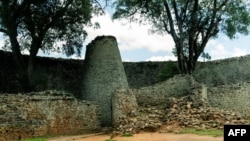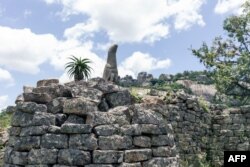Continued decay of the Unesco World Heritage Site has necessitated support from the French Development Agency and United Nations Office for Project Services or UNOPS.
“The overall objective is to stimulate sustainable inclusive tourism development and cultural heritage of Zimbabwe through enhancing the World Heritage Site itself and strengthening national capacities to manage the site,” said Salesio Zvawada, UNOPS project manager.
The ancient stone city, that thrived near the modern-day town of Masvingo, Zimbabwe from about 1290 to 1450, was the capital of the Mutapa Empire.
The site consists of the Hill Complex and the Great Enclosure.
“One has to be there to be there to really witness the highest degree of engineering in traditional stone masonry,” Lovemore Mwayiyana, a tour guide at the heritage site told VOA of the Great Enclosure, the second-largest pre-colonial structure in Africa after the pyramids of Egypt,
“They never used any mortar or any cement so for equilibrium and stability, the base was always made broader then it gets progressively thinner towards the top,” Mwayiyana added.
The Great Enclosure is the second largest pre-colonial structure in Africa after the pyramids of Egypt, using about 18,000 tons of stone.
Part of the preservation project will include monitoring the brick walls with state-of-the-art 3D technology to keep up with which walls are moving and at risk of falling, allowing the National Museums and Monuments of Zimbabwe team to make timely interventions to preserve and restore them.
The project will also support building new facilities to improve the experience of visitors.
“The Great Zimbabwe world heritage site was one of the world’s key centers of civilization… [it] plays an important role as a cultural tourism center in the province, in the nation and the world at large.,” Jefter Sakupwanya, Masvingo Secretary for Provincial Affairs told VOA.
UNOPS says it is also working with the local tourism authority and other stakeholders to market the city of Masvingo as a tourism destination.
The UNOPS preservation and development project that began in June this year, and is expected be finalized in three years.








